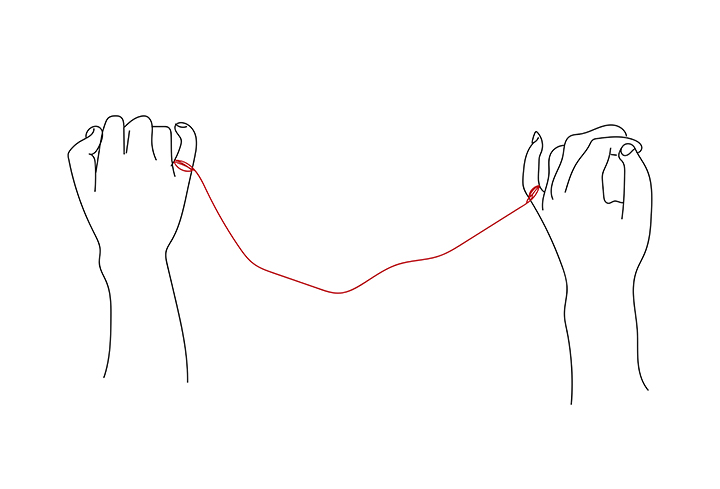Falling in Love Starts with Projection
“The factors which come together in the coniunctio are conceived as opposites,
either confronting one another in enmity or attracting one another in love.”
— Carl Jung, Mysterium Conuinctionis, paragraph 1
Unless we can experience retrieving our shadow which is a very long and laborious process, we may never be able to understand the masculine and feminine contra-sexual images in our unconscious which Carl Jung called the “Anima” and “Animus.” These images, deep within our unconscious began with our first experience of the opposite sex — our mother and father.
A woman carries an image of her male counterpart, her “Animus,” who is made up largely of her history with her father, brothers, or any significant early experiences with men. This inner masculine helps her to achieve her goals, gives her greater intellectual clarity, helps her have clearer boundaries and becomes a mediator between her ego and her unconscious. This unconscious inner male is her God (soul) image that gets projected onto a man in the outer world. As inner and outer create a mirroring effect, she will discover a great deal about her masculine inner partner by identifying characteristics of the person upon whom the projection lands.
According to Jung, a man faces a similar dilemma. When a man projects his perfect God (soul) image onto a woman, she becomes the carrier of his “Anima.” His Anima, his inner feminine, once he consciously discovers her and can start up a dialogue within, she can help him get in touch with his feeling nature, his receptivity, his personal relating and nurturing skills, and his ability to create. His Anima acts as a muse to bridge the gap between his inner and outer worlds.
The Anima and Animus animate us and give us the energy to live our lives. Because they are archetypes, we can never really and directly experience them, so we project them onto a suitable lover whom we then begin to idealize. Idealization of the partner is how we first begin the dance of mating that has actually been activated by the unconscious of each person. Jung says we don’t consciously choose who we fall in love with. Our unconscious chooses for us.
When this happens to both people at the same time, we call this “falling in love.” They definitely fall. They fall into their own unconscious image as each projects part of themselves onto the other person (same sex or opposite sex), evoking a feeling of fantasy and Eros. The erotic and sexual nature of the encounter is psychologically quite symbolic. It’s intense. The people we are extremely attracted to are the parts of ourselves that we are missing. When we have a strong attraction and compulsion toward another individual while perceiving we are “in love”, it is a real clue that this is a projection of our own unconscious contents.
The feminine and the masculine principles, uniting as one, inside each person is where we are headed in the Age of Aquarius because the old paradigms of the Age of Pisces are no longer viable for our evolution. We are each being called to a new way of being in the world. If we grow in awareness and are patient and diligent in this new paradigm, as we do this inner work, we are also contributing to the Cosmos as well as the God Image. Ultimately, this will be a new way of relating to each other that can liberate us from the destructive and soul-destroying romantic relationships that have caused so much confusion, suffering and sacrifice in the Age of Pisces.
It’s a difficult idea to accept in this time where so much importance is given to dramatic romantic illusions. We are brought up with Cinderella and Sleeping Beauty fairy tales. The belief “someday my prince or princess will come” is part of the collective psyche. Movies like Romeo and Juliet and The Titanic are examples of the modern myth in our culture that says this magical numinosity is what we should be experiencing. These fantasies are projected out every time we are fascinated by a potential partner. I say fascinated because “attracted” isn’t the word for it. Fascination is what holds us like glue, where simple physical attraction is more subtle and much less intense. Jung says that in order for a fascination to take place, both people must be involved. He says:
A fascination of this kind is never exercised by one person upon another; it is always a phenomenon of relationships, which requires two people in so far as the person fascinated necessarily has a corresponding disposition. But the disposition must be unconscious or no fascination will take place. The fascination is a compulsive phenomenon in the sense that it lacks a conscious motive; it is not a process of will, but something that rises up from the unconscious and forcibly obtrudes itself upon the conscious mind.
—Carl Jung, Two Essays in Analytical Psychology, paragraph 136
Just as with the shadow, this fascination can also be experienced as repulsion. We can be simultaneously attracted and repulsed by the very same person if they say or do something we don’t like. Our partners can annoy us, and it’s usually out of proportion to what they actually did, because they are carrying a projected shadow part of us. Notice also, that in the movies like The Titanic and Romeo and Juliet, a death occurs. This too, is symbolic, as we have to go through the death or removal of our projections.
Most of us have heard the term projection by now, but what people do not realize is that we are not the ones who is projecting. It is not something that we do of our own volition. It is our unconscious that projects itself out onto the other person. This psychological phenomenon is what we are experiencing all the time, and it is especially important that we understand what is happening when it comes to the mating experience.
When we get to about forty, we realize that this same kind of person keeps magically appearing as if it is a coincidence. It is not. As we mature and gain insight into our behavior, we come to the realization that this pattern has happened before. What we always experience is our own energy through the other. If we are doing introspective work to become conscious, which is the goal of what Carl Jung called ‘individuation,’ we begin to ask questions. What is this about? Why is this repeating? When I first learned about this information, I thought to myself, “this is so valuable and enlightening, everyone should know it.”
When we’re falling in love, we’re actually putting part of our soul (our own inner beloved) on that person. They can carry it for us for a time, but if anybody has been married before, or in and out of relationships, we know that eventually the projections onto our beloved are going to fall off. We will no longer be able to believe that this is a magical and perfect being as their shadow and our shadow will become glaringly obvious to both of us.
Projection is natural, we all do it. Even if it lands on someone and we marry them, eventually consciousness enters the picture and this highly unconscious, delicious state will end. No one can carry our projections forever. Becoming aware of our opposites is a lifetime work. No one does it overnight, and no one does it in one relationship even. Yet, all relationships begin this way as that is the only way to recognize that inner and outer are really one unified organism. I remind you all of the Hermetic, Alchemical dictum, “As Above so below, as within, so without.”
When we are separated from these contrasexual images, we will feel what primitives called a LOSS of SOUL. Because the carrier of the projection has our ‘soul,’ and if the relationship is not maintained or doesn’t work out, we are still looking for that one special person to complete us. At the beginning, it is quite compelling as we all put on our rose-colored glasses. But, as St. Paul says, “we see through a mirror darkly.” This idealization we all experience in the beginning, is actually a defense mechanism that keeps us from differentiating from our partners as what we are seeking in romantic love unbeknownst to us is oneness with God. We are seeking the transcendence in a human being. Robert Johnson, in his book, We, Understanding the Psychology in Romantic Love says,
“Though no one notices at the time, in-loveless obliterates the humanity of the beloved. One does a curious kind of insult to another by falling in love with him, for we are really looking at our own projection of God, not at the other person. If two people are in love, they tread on star dust for a time and live happily ever after — that is so long as the experience of divinity has obliterated time for them. Only when they come down to earth do they have to look at each other realistically and only then does the possibility of mature love exist.”
Robert Johnson also says that romantic love is narcissistic in that we are seeking a projected image of ourselves, and it will eventually end with varying degrees of animosity. There is no perfect person out there who will magically fulfill our every fantasy and only a child expects perfection. Relating as an adult, we learn to compromise and accept some of the unacceptable in others. We learn tolerance and compassion for our idiosyncrasies, mistakes of others because we will find out sooner or later that we cannot make Gods and Goddesses out of real people. My teacher, J. Pittman McGehee says, “Some people are serial projectionists and will just keep going from person to person,” because it is hard to see each other’s shadow. When the projections do fall off, then both have an opportunity to love a real human being, and this takes maturity and consciousness.
“Both of them are unconscious powers, “gods” in fact, as the ancient world quite rightly conceived them to be. To call them by this name is to give them that central position in the scale of psychological values which has always been theirs whether consciously or unconsciously acknowledged or not, for their power grows in proportion to the degree that they remain unconscious. Those who do not see them are in their hands, just as a typhus epidemic flourishes best when its source is undiscovered.”
—Carl Jung, AION, Research into the Phenomenology of the Self, paragraph 41
And …
“Unless we prefer to be made fools by our illusions, we shall, by carefully analyzing every fascination, extract from it a portion of our own personality, like a quintessence, and slowly come to recognize that we meet ourselves time and again in a thousand different disguises on the path of life.”
—Carl Jung, The Practice of Psychotherapy, The Psychology of the Transference, paragraph 534
If we don’t see these people as a part of us, then, yes, we are going to suffer at their hands because we don’t realize we’ve projected our own divinity onto them. They represent our unconscious Anima, Animus or shadow. To the degree we are unable to see exactly what part of us they represent, it becomes very painful when we try to distance or separate from them because we need and crave that part. We’ll feel like a part of us has died when they leave us. The emotional pain is agonizing.
Another dilemma in relationships is if you are involved with a person who can’t ever say they are sorry, or they have major issues. Everyone must learn to admit mistakes and say out loud, “I am sorry,” since no one is right or behaves perfectly all the time. What if you say something to your partner when they do something you don’t like, something that was clearly disrespectful to you, that crossed your boundaries. You tell them your feelings and ask them to not do it again. Then they do it again and again. That person can be exhibiting unconscious passive aggressive behavior, and you are not going to change that person. They have to do their own work and we can’t save or fix people. They have to want to look at themselves and their own behavior.
There are also other personality disorders, and those too can be difficult to deal with when an individual has not yet developed a strong enough ego. Jung says we cannot admit fault and give up our prideful ego responses to confrontation when we have a weak ego. It takes ego strength to muster up the courage to vulnerably admit our own mistakes and weaknesses to each other and make a sincere effort to change. It is helpful if we can both recognize when we are polarizing with each other. When partners start acting out two huge extremes, it can become very uncomfortable and does not work. It’s balance that works. Talk to your partner. Tell them you want to meet them halfway.
A friend told me a story last week about how she meets a previous boyfriend once a year for lunch and that he recently told her that She was the one that got away, and he could never forget her. They are both, of course, married to two imperfect people and she carries a projection of his Anima for him.
We like “the you” that was projected at the beginning of the fascination. Not this you that you are now displaying. So now, through using anger, control, sexual withdrawal, and a variety of other manipulations, we try to force the other person to live out our imaginary and projected image of who we thought they were. And they can’t live up to that kind of expectation and be true to themselves. NOW we are faced with the task of establishing a real relationship with the REALITY of who they are not who we thought they were.
We really don’t know anyone until we marry them. When we’re together day in and day out, we will see them in a lot of different situations, and they will also see us. Now we are having a real relationship and as the projections fall off, we will find they are sometimes the ideal we pictured them to be and sometimes they, too, will annoy the hell out of us. They will no longer provide the constant magic for us that we thought we would have when we married them. They become real in our eyes. Conversely, if we never have a relationship with them, then we can go our whole lives thinking they were Prince Charming or Sleeping Beauty. This other kind of love is only romantic images and ideals we all have. These will ultimately disappoint us because no one out there is perfect, and neither are we.
Another thing that often happens is that both people have a non-verbal agreement to keep their fantasy alive by not telling the other what they are really thinking or feeling. They tell their friends and families but never each other. They say, “Oh, no I could never tell him that. He would get angry with me.” In order to keep the peace, they keep their truths hidden from each other. This way they can hold on to the illusion that they are relating to each other, which is far from the truth. Jung calls this deception (a key Piscean word) an unconscious relationship.
In his book, The Eden Project, In Search of the Magical Other, James Hollis explains, “In the beginning we may have loved their otherness, but now it starts to drive us up a wall. They must have changed! We tell ourselves.” It’s interesting to hear ourselves or others say, “You are NOT who I thought you were.” Well, of course they are not. Here’s a startling insight. We didn’t really know them.
Rebeca Eigen
Rebeca Eigen, an astrologer for 25+ years and author of The Shadow Dance & the Astrological 7th House Workbook specializes in relationships. From every day decisions, to critical life-altering moments, Rebeca shares with you her practical wisdom and guidance for your life’s journey in becoming who you are meant to be.
https://www.shadowdance.com/




